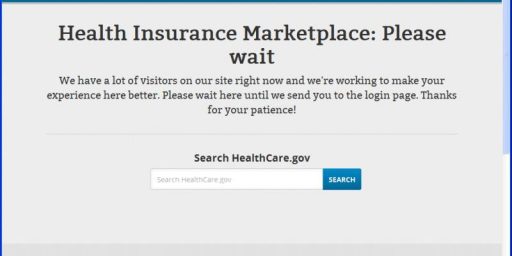SCOTUS Rules Congress Can’t Reneg on ObamaCare Insurer Bailout
An 8-1 rebuke from the nation's highest court.

WaPo/AP (“Court rules insurers can collect $12B under health care law“):
The Supreme Court ruled Monday that insurance companies can collect $12 billion from the federal government to cover their losses in the early years of the health care law championed by President Barack Obama.
Insurers are entitled to the money under a provision of the “Obamacare” health law that promised the companies a financial cushion for losses they might incur by selling coverage to people in the marketplaces created by the health care law, the justices said by an 8-1 vote.
The program only lasted three years, but Congress inserted a provision in the Health and Human Services Department’s spending bills from 2015 to 2017 to limit payments under the “risk corridors” program. Both the Obama and Trump administrations had argued that the provision means the government has no obligation to pay.
But Justice Sonia Sotomayor said in her opinion for the court that the congressional action was not sufficient to repeal the government’s commitment to pay. “These holdings reflect a principle as old as the Nation itself: The Government should honor its obligations,” Sotomayor wrote.
In dissent, Justice Samuel Alito wrote that the court’s decision “has the effect of providing a massive bailout for insurance companies that took a calculated risk and lost. These companies chose to participate in an Affordable Care Act program that they thought would be profitable.”
Reuters (“U.S. Supreme Court rules for insurers over $12 billion Obamacare claims“) adds:
The 8-1 ruling authored by liberal Justice Sonia Sotomayor paves the way for a significant one-time cash infusion for major companies such as Humana Inc, Anthem Inc and Centene Corp. The justices reversed a lower court’s ruling that Congress had suspended the government’s obligation to make such payments.
The court agreed with insurers that said that the lower court ruling, if allowed to stand, would have let the government pull a “bait-and-switch” and withhold money the companies were promised.
[…]
Republicans, who have opposed Obamacare from the outset and numerous times sought to repeal it in Congress, have – like Alito – called the risk-corridor program a “bailout” for the insurance industry.
From 2015 through 2017, Congress passed legislation barring HHS from using general funds to pay the government’s risk corridor obligations.
Health insurers turned to federal courts to obtain the payments. The U.S. Court of Appeals for the Federal Circuit ruled in 2018 that Congress effectively repealed its obligation to pay the insurers, prompting the insurers to appeal to the Supreme Court.
USA Today (“Supreme Court requires government to pay health insurers under Affordable Care Act“) adds:
Because insurers took considerable risks when they agreed to participate in Obamacare’s marketplaces, the original 2010 law included limits on the amount of losses they could incur. But when the bill came due to cover some of those losses several years later, the government refused to pay.
Paul Clement, the former U.S. solicitor general representing the insurers, called it a $12-billion “bait and switch.” But a federal appeals court ruled that Congress had the right not to appropriate the funds.
During oral argument in December, Chief Justice John Roberts said the insurers “would not have participated in the risk corridor program but for the government’s promise to pay.”
Added Associate Justice Stephen Breyer: “Why does the government not have to pay its contracts, just like anybody else?”
The outcome seemed obvious. The ruling was 8-1 on its merits, with Justices Thomas and Ginsburg disagreeing only on technical issues; Alito was alone in his dissent.
Congress naturally has the right to change its collective minds and defund a program. I’m sympathetic to the notion that the fund in question was indeed a “bailout.” especially since there was no offsetting requirement for insurers to return any windfall they received as a consequence of the act.
But Roberts makes the key point: regardless of the merits of the original plan, insurers relied on the guarantee in making their risk calculations. They’re not entitled to that deal remaining in place indefinitely. But they’re certainly entitled to compensation for the period when the deal was in place.
UPDATE: Based on a comment below and further research, I’ve corrected my incorrect supposition that the risk corridor was only one-way.
I checked SCOTUSBlog before posting but they hadn’t yet gotten to more than a one-sentence summary. Amy Howe has subsequently weighed in. Her summary of the underlying facts is better than that of the above-cited media sources:
As part of the Affordable Care Act, Congress created “risk corridors” to balance out the risks that insurers faced from offering health insurance on the exchanges, where the insurers would have difficulty predicting how much it would cost to provide health care for their new customers, many of whom would not have had insurance previously. To address this problem, Section 1342 of the ACA established a mechanism that would allow insurers to share both profits and losses for the first three years in which the exchanges operated: Insurers that collected premiums that exceeded their costs would have to make “payments in” to the government to share the benefits, while insurers whose costs exceeded the premiums they collected would receive “payments out” from the government to compensate for their losses. However, beginning in 2014, Congress restricted the funding available to reimburse insurers for their losses, which proved to be substantial: The government owed unprofitable plans $2.87 billion in the first year alone, while profitable plans owed the government only $362 million.
Her explanation of Alito’s dissent is fairer to him than some of the commenters here:
Justice Samuel Alito dissented from today’s ruling. Even assuming for the sake of argument that his colleagues are correct that Section 1342 requires the government to reimburse insurers for their losses under the risk-corridor program, and that Congress did not impliedly repeal that obligation, Alito disagreed with the court’s ruling that the insurers can rely on the Tucker Act to bring their claims. The Tucker Act, Alito contended, waives the government’s immunity from lawsuits seeking money and gives federal courts the power to hear those lawsuits, but it does not create a private right for the insurers to sue. That question is important, Alito continued, not simply because, following today’s decision, “billions in taxpayer dollars will be turned over to insurance companies that bet unsuccessfully on the success of the program in question,” but also because other federal statutes contain language similar to the language in Section 1342 that the court relied on to conclude that the insurers can bring their claims. Without a better explanation of how “to reconcile our approach to inferring rights of action in Tucker Act cases with our broader jurisprudence,” and because he believes that the question has not received sufficient attention in the case, Alito would “request supplemental briefing and set the cases for re-argument next term.”






It’s rich that Alito, would object to bailing out the rich. He’s attempting to carve out a position that he can use in some future case.
Unlike the Trump Organization the US government should pay its debts.
Fascinating to see that Alito hates Obama even more than he loves rich corporations.
Interesting, Alito believes that the law should reflect what he believes the program should be rather than what is written. What theory of constitutional law is this again?
Piling on…
So he would establish SCOTUS precedent that taking Congress at its word is “a calculated risk”?
“especially since there was no offsetting requirement for insurers to return any windfall they received as a consequence of the act.”
James, that is incorrect.
The ACA risk corridor provision was a 2 sided arrangement where companies that made too much money paid a significant portion of that excess profit back to the federal government. There were some companies that did that. The fundamental problem was that in 2014 and 2015, the entire ACA market was a fundamentally unknown market with a serious winner’s curse going on where the most optimistic actuary would be too optimistic and price too low to pick up all of the membership. Under that structure, way more companies lost lots of money than made lots of money (7:1 roughly)
Is there any legal merit to Alito’s dissent?
Doesn’t it come from Article IX–the famous “heads I win, tails you lose” principle?
I’d ask Alito: If the government decides at some point to stop paying Social Security benefits, would that be ok as employees contributed to Social Security shouldn’t expect to be bailed out because they took a calculated risk and lost?
@Kathy:
That’s the kind of future argument that I was referring to
@Robert Levine:
Honestly, if there isn’t, that’s been in keeping with most of his dissents over the last few years.
Vox:
(My bolding)
@Kathy:
This was already settled in 1960:
https://en.wikipedia.org/wiki/Flemming_v._Nestor
You’re not going to like the answer.
@mattbernius: I do wish that Supreme Court justices had to appear before the judiciary committee for a question and answer time. It would be a lot of grandstanding, but it would also demystify the process.
Calling this arrangement a “bailout” is really political spinning and rather economically and contractually inaccurate. From the description these are something like insurance options and are not “bail outs” (which rather is a phrase used for unplanned rescues to rescue entities). One does not call insurance payouts based on contractually set criteria “bail outs” (unless one is a slimy political spinner) so one should not name these payments bail outs.
Whether it was good policy or not I haven’t an opinion, but from an insurance and financial contracting point of view, these are quite clearly not bail outs in the normal sense of the usage.
@DAVID Anderson: @Teve: I’ve updated the post. I was relying on the media summaries and misunderstood the deal.
@James Joyner: Understandable, this stuff is complicated. It is immediately adjacent to my primary research interest/area (consumer behavioral economic response to ACA insurer strategy) so I’m very aware of the mechanics at a level that is probably not particularly healthy for me.
Several other people have said this, but I really do wonder if SCOTUS was sending a message, saying “get over it”.